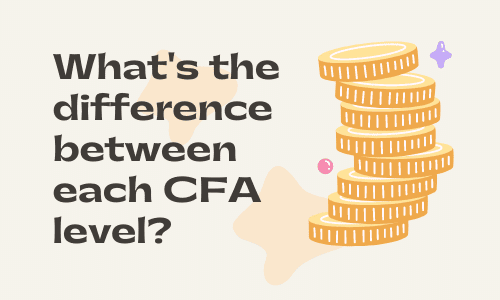
To become a CFA®, you must pass Levels 1, 2, and 3 of the Chartered Financial Analyst Exam®. You will be tested on a range of topics that are relevant to the coveted position. But what exactly are the differences in terms of structure and material between the different CFA exam levels?
CFA® Level 1
The first CFA® exam you must take is 6 hours long and is broken up into two three hours sessions– one in the morning and one in the afternoon. During each session, you must answer 120 questions, which leads to a total of 240 questions. That brings you to an average of 1.5 minutes to answer each question. These multiple choice questions are freestanding, meaning they are not dependent on each other.
CFA Level I Exam Test Content

This level focuses on basic concepts of tools, ethical and professional standards, investment valuation, and portfolio management. Ethics are a big part of this level and the remainder of the CFA® exam (Levels 1, 2, and 3). You will have to know the code of ethics, professional standards, and the Global Investment Performance Standards (GIPS) to be able to answer the many questions in this section. Depending on how you perform on all other topics, your score on ethics could decide whether you pass or fail.
A lot of Level 1 will test you on financial reporting and analysis. Again, you want to build a solid foundation in this area during your studies to ensure you will do well on the subsequent levels. All test takers need to demonstrate an understanding of all 3 types of financial statements. To be specific, these are income statements, cash flow, and balance sheets.
Make sure to check out the CFA Institute’s breakdown of the exam for more detailed information on the advanced test topics.
CFA Level I Exam Study Tips
In addition to ethics and financial reporting, Level 1 exam questions cover a wide spectrum of topics, including alternative investments, derivatives, fixed income, equity investments, portfolio management, corporate finance, and quantitative methods. Some topics may require proportionally more time to study than others. However, it is important to not only memorize the information, but also to possess a deep understanding of concepts in order to succeed later in the exam. That’s why students who supplement their study with an additional test bank or video lectures tend to fare better than those who do the bare minimum.
CFA® Level 2
While also being made up of multiple choice questions, Level 2 is structured differently than Level 1. Questions are organized into groups of six called “item sets.” Each item set will have a mini case statement followed by the accompanying six questions. This is tricky, as the questions are dependent on each other, meaning if you get one wrong, chances are you get all 6 wrong. There will be a total of 20 item sets separated by the two sessions—ten for the morning and ten for the afternoon.
CFA Level II Exam Test Content
Level 2 of the CFA® exam focuses on the application and analysis of concepts learned in Level 1. This means there will be questions regarding asset valuation, equity, and fixed income. So if you studied well enough for Level 1, this next level will have you prove your knowledge through application.
One of Level 2’s most major aspects is accurate financial reporting. Candidates must understand each aspect of a financial report and how to analyze what’s been filled out correctly or incorrectly. The best way to prepare for this is to review CFA Institute’s breakdown of exam topics and questions for Level 2.
Level 2 also tests you heavily on your knowledge of corporate finance. This ties heavily into other forms of financial reporting so you should pick up on this while studying other content areas. Still, make sure to dedicate some time to learning about test topics unique to corporate finance.
CFA Level II Exam Study Tips
The CFA® Level 2 exam is a little trickier than Level 1 since you are asked to apply concepts, rather than just understand them. So, it’s critical that you spend time practicing and taking CFA® mock exams, while reviewing your weaker areas throughout your preparation. Wiley provides 3 full mock exams that are widely considered to be the best, while Bloomberg has 8 full mock exams, more than any other test prep company.
CFA® Level 3

This level is only offered in June and is set up differently than the previous levels. You still have morning and afternoon test sessions, but the types of questions will be different. Your morning session will include 10-15 essay type questions. These questions may give you a situation where you must produce your own recommendation or solution. The afternoon session will consist of 10 item sets, like the question format of Level 2.
CFA Level III Exam Test Content
Level 3 focuses on portfolio management and wealth planning, making up half the points of the entire level. You will have to face portfolio management concepts in both morning and afternoon sessions such as behavioral finance, risk management, and individual and institutional wealth.
The number of concepts that can be tested are limited but important. One highly tested concept is the Investment Policy Statement and its components. Economics, which was tested in both Level 1 and 2, is included under portfolio management in this level. Other important concepts are managing portfolios of institutional investors, asset allocation, risk management applications and evaluating portfolio performance.
The CFA Institute provides a Level 3 test breakdown on their site. Make sure to use this valuable tool to see a more exact breakdown of the topics on this exam.
CFA Level III Exam Study Tips
The Level 3 exam is probably the toughest out of all three levels since many of the questions are posed in essay format. The key to success is to practice as many essay type questions as possible and master topics specifically related to portfolio management, which is at the core of this level. I recommend getting a study guide for Level 3 specifically, since the format is so different from both sections 1 and 2.
Now that you know more about the three different levels of the CFA® exam, you should begin to create a solid plan for your test preparation. Creating an honest study schedule and arming yourself with a superior test prep course are your best possible moves to successfully passing each level on your first try. Minimizing the stress and anxiety in your preparation really starts with a confident decision in your test prep course.


